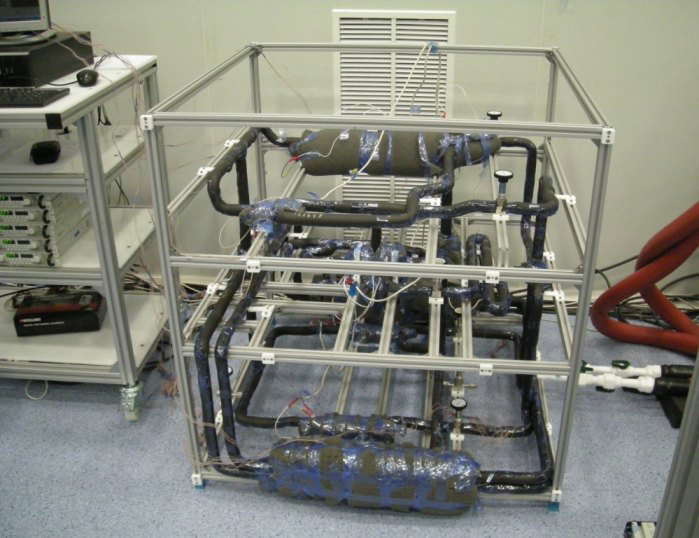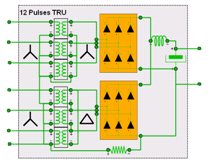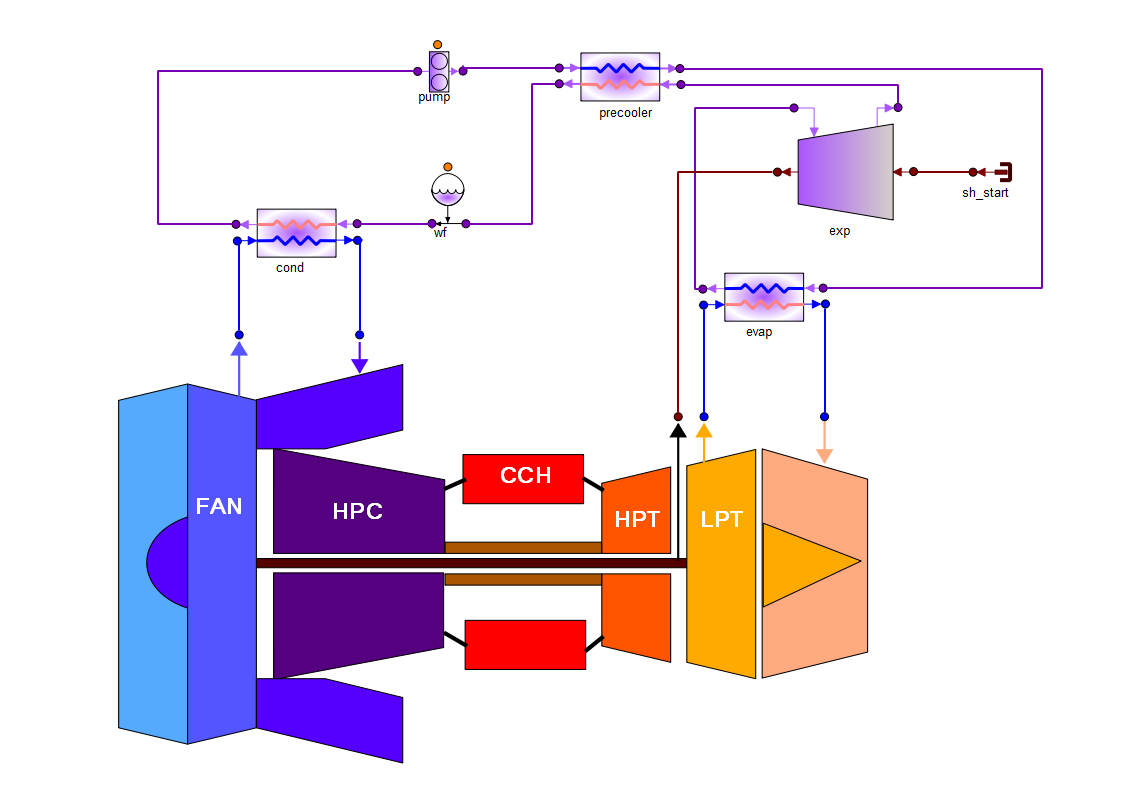Software & Services
Simulation Platforms
 EcosimPro
EcosimPro
EcosimPro is a first-class simulation tool for modelling continuous-discrete systems. It uses an acausal paradigm that lets you reuse models from one project to another. EcosimPro is the official tool of the European Space Agency in multiple fields.
 PROOSIS
PROOSIS
PROOSIS is a state-of-the-art tool for 1D modelling of aeronautical gas turbines based on EcosimPro. It provides additional capabilities for representing and designing new propulsion systems.
Toolkits for Space Applications
Space Propulsion
EcosimPro and PROOSIS have several professional toolkits for the 0D/1D modeling and simulation of space propulsion systems. They are now being used by cutting-edge companies to develop advanced projects for spacecraft, satellites and more. The toolkits are the state of the art in this area in terms of components and mathematical solvers.
 Space Propulsion Simulation Toolkit (ESPSS)
Space Propulsion Simulation Toolkit (ESPSS)
The European Space Propulsion System Simulation (ESPSS) toolkit provides components and functions for simulating spacecraft and launch vehicle propulsion systems. It is the standard tool of the European Space Agency and European Industry for propulsion simulation.
 Dynamic Fluid Networks Simulation Toolkit (FLUIDAPRO)
Dynamic Fluid Networks Simulation Toolkit (FLUIDAPRO)
FLUIDAPRO is a toolkit to model and simulate complex dynamic fluid networks (gas, liquid and two phase flow regimes for ideal or real fluids), coupled to heat transfer effects and control loops.
 Liquid Propellant Rocket Engine Simulation (LPRES)
Liquid Propellant Rocket Engine Simulation (LPRES)
The LPRES (Liquid Propellant Rocket Engine Simulation) educational library contains components for predicting the steady-state behaviour of the different configurations a liquid propellant rocket engine may have. This educational library aims at imitating the capabilities of the professional ESPSS libraries but using much simpler models and equations. LPRES, together with the EcosimPro Educational license, is particularly suitable for teaching chemical propulsion at universities.
Life Support
 Manned Spacecraft Life Support System Simulation Toolkit (ECLSS)
Manned Spacecraft Life Support System Simulation Toolkit (ECLSS)
The Environmental Control and Life Support Systems (ECLSS) toolkit simulates the equipment and processes of an ECLS system, such as cabins, crews, heat exchangers, pipes, pumps, chemical reactors and electrolyzers. It simulates biological processes as well. The ECLSS toolkit is the standard tool of the European Space Agency (ESA) and European Industry for environmental control and life support system analyses.
Thermal Control
 Two-Phase Capillary Systems (TPCS)
Two-Phase Capillary Systems (TPCS)
The Two-Phase Capillary Systems (TPCS) is a new toolkit for the simulation of Loop Heat Pipes (LHP) and Capillary Pumped Loops (CPL). It has been developed and validated against experimental test results. TPCS is currently an internal tool of Iberespacio (EA’s subsidiary); however, a commercial version is expected to be available soon.
Toolkits for Aeronautics Applications
 Gas Turbine Simulation Toolkit (TURBO)
Gas Turbine Simulation Toolkit (TURBO)
The TURBO toolkit can be used to help design and calculate the performance of aircraft engines based on gas turbines, as well as to study transients and perform advanced calculations for the control and monitoring of the engine.
 Environmental Control Systems Simulation Toolkit (ECS)
Environmental Control Systems Simulation Toolkit (ECS)
The ECS toolkit contains all the components and functions needed for the dynamic and steady simulation of the Environmental Control System (pressurizing the cabin, controlling the pressure and temperature onboard, etc) and other pneumatic systems of the aircraft.
 Aircraft Electric System Simulation Toolkit (ELECTRIC_SYSTEMS)
Aircraft Electric System Simulation Toolkit (ELECTRIC_SYSTEMS)
The ELECTRIC_SYSTEMS toolkit provides components of the various electrical systems in the aircraft, both for AC current with constant or variable frequency, as well as for DC current. These components are key for studies on More Electric Aircraft.
 Organic Rankine Cycle Simulation Toolkit (ORC)
Organic Rankine Cycle Simulation Toolkit (ORC)
The ORC toolkit calculates the thermodynamic design and off-design of an Organic Rankine Cycle (ORC) and the performance of the aircraft engine when coupled to the ORC system.
Toolkits for Power, Water, and Process
 Power Plant Transient Simulation Toolkit (PPTS)
Power Plant Transient Simulation Toolkit (PPTS)
PPTS (Power Plant Transient Simulation), currently an EA International in-house toolkit, provides modeling components to represent the dynamics of typical hardware and controls of a power plant.
 Solar-Thermal Power Plant Simulation (ST_PPTS)
Solar-Thermal Power Plant Simulation (ST_PPTS)
ST_PPTS (Solar Thermal Power Plant Transient Simulation), currently an EA International in-house toolkit, allows the dynamic simulation of the plant operation modes of parabolic through power plants with optional thermal energy storage and fossil fired backup systems.
 Power Plant Thermal Balance Simulation Toolkit (THERMAL_BALANCE)
Power Plant Thermal Balance Simulation Toolkit (THERMAL_BALANCE)
THERMAL_BALANCE toolkit is used to carry out steady state thermal balance studies in typical power generating plants (Coal, Combined Cycle, Nuclear, Thermosolar, etc). It also enables performing studies with slow dynamics where model boundary conditions change with time.
 Gas Turbine Engine Simulations For Power Generation Applications (GTE_TURBOSHAFT)
Gas Turbine Engine Simulations For Power Generation Applications (GTE_TURBOSHAFT)
The GTE_TURBOSHAFT is a toolkit for simulating gas turbine turboshaft engine configurations typically used in industrial applications (e.g. for power generation or mechanical drive) and for marine vessel propulsion. The user can perform both design point and off design calculations as well as to study transients and perform advanced calculations for the control and monitoring of the engine.
 Dynamic Fluid Networks Simulation Toolkit (FLUIDAPRO)
Dynamic Fluid Networks Simulation Toolkit (FLUIDAPRO)
FLUIDAPRO is a toolkit to model and simulate complex dynamic fluid networks (gas, liquid and two phase flow regimes for ideal or real fluids), coupled to heat transfer effects and control loops.
 Thermo-Hydraulic Transient Simulation Toolkit (PIPELIQTRAN)
Thermo-Hydraulic Transient Simulation Toolkit (PIPELIQTRAN)
PIPELIQTRAN is a toolkit to analyze thermo-hydraulic transients including water hammer and pressure surge phenomena in liquid (non-compressible) piping networks.
 Presure and Mass Flow Balance in Hydraulic/Liquid Systems (PIPELIQ)
Presure and Mass Flow Balance in Hydraulic/Liquid Systems (PIPELIQ)
PIPELIQ is a toolkit to balance the pressures and mass flow in hydraulic/liquid systems, and to consider thermal delay and thermal storage.
 Desalination Plants Simulation Toolkit (ROSIM)
Desalination Plants Simulation Toolkit (ROSIM)
The Reverse Osmosis SIMulation (ROSIM) toolkit is designed to simulate the reverse osmosis desalination process, and also includes components for simplified simulation of thermal desalination processes (MSF and MED) and energy recovery systems.
 Cryogenic System Simulation Toolkit (CRYOLIB)
Cryogenic System Simulation Toolkit (CRYOLIB)
The CRYOLIB toolkit is specially designed to simulate cryogenic processes and their control systems, based on a library originally developed and validated at the European Organization for Nuclear Research (CERN).
 Tritium Transport and Process Simulation Toolkit (TRITIUM)
Tritium Transport and Process Simulation Toolkit (TRITIUM)
Developed in collaboration with the National Laboratory for Fusion Energy (Ciemat), TRITIUM_LIBS includes two different areas of application:
- Test Blanket Systems (TBS), where Test Blanket Modules (TBMs) and their ancillary systems are modelled for studying the behaviour of tritium and its transport phenomena.
- Tritium Plant, focused on the process for recovering tritium from the torus exhaust gases.
 Electrical/Electronics Systems Simulation Toolkit (ELECTRIC_SYSTEMS)
Electrical/Electronics Systems Simulation Toolkit (ELECTRIC_SYSTEMS)
The ELECTRIC_SYSTEMS toolkit includes rotating machinery, transformers, converters, power poles, control and protection devices, etc, as well as components for renewable energy plants and their controls in smart grid applications.
Other Common Toolkits
Other common simulation toolkits, to be used jointly with previous toolkits, include CONTROL, THERMAL NETWORK, ELECTRICAL and MECHANICAL components.
-
The CONTROL library provides a wealth of components with which to model any current control structure covering analogue, digital and mixed systems.
-
The PREDICTIVE CONTROL library incorporates the multivariate linear predictive controllers DMC and GPC with restrictions.
-
The THERMAL library allows the modelling of a continuous medium as a discrete thermal network of nodes linked by conductors.
-
The ELECTRICAL library contains the basic components for building electric and electronic systems.
-
The MECHANICAL library contains components to model 1-dimensional translational and rotational mechanical systems.
